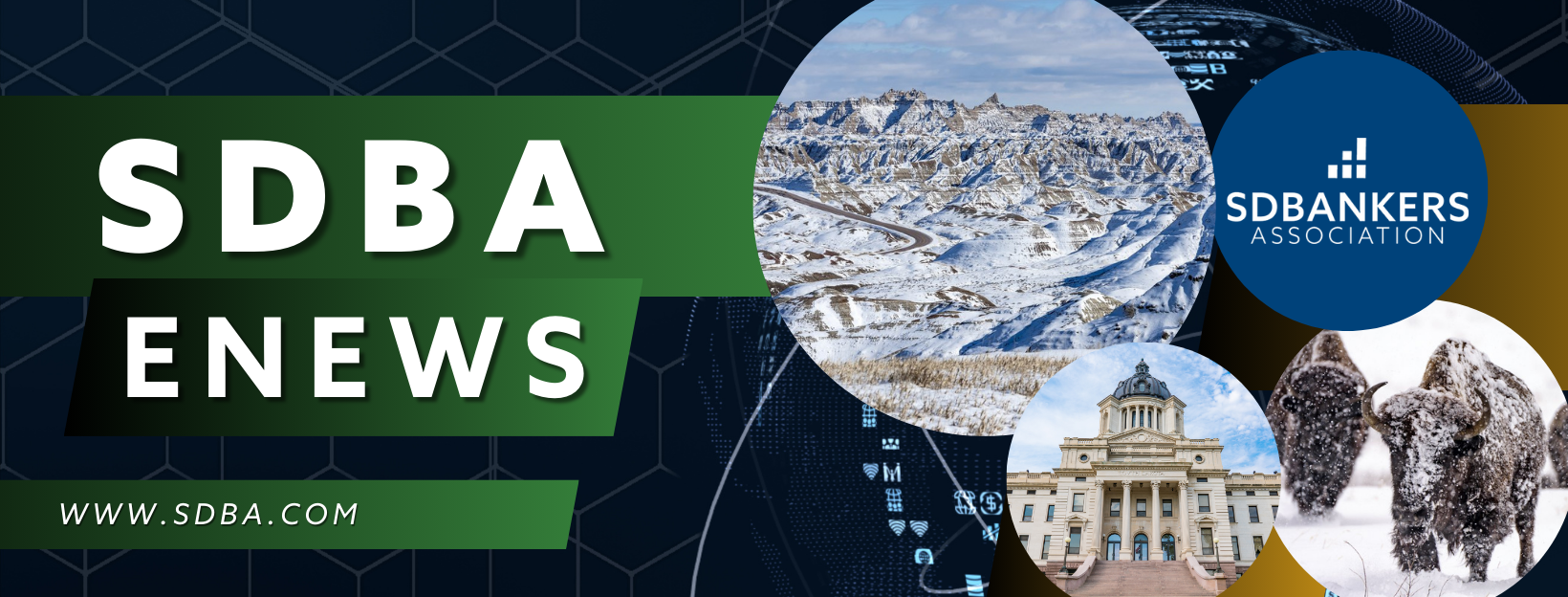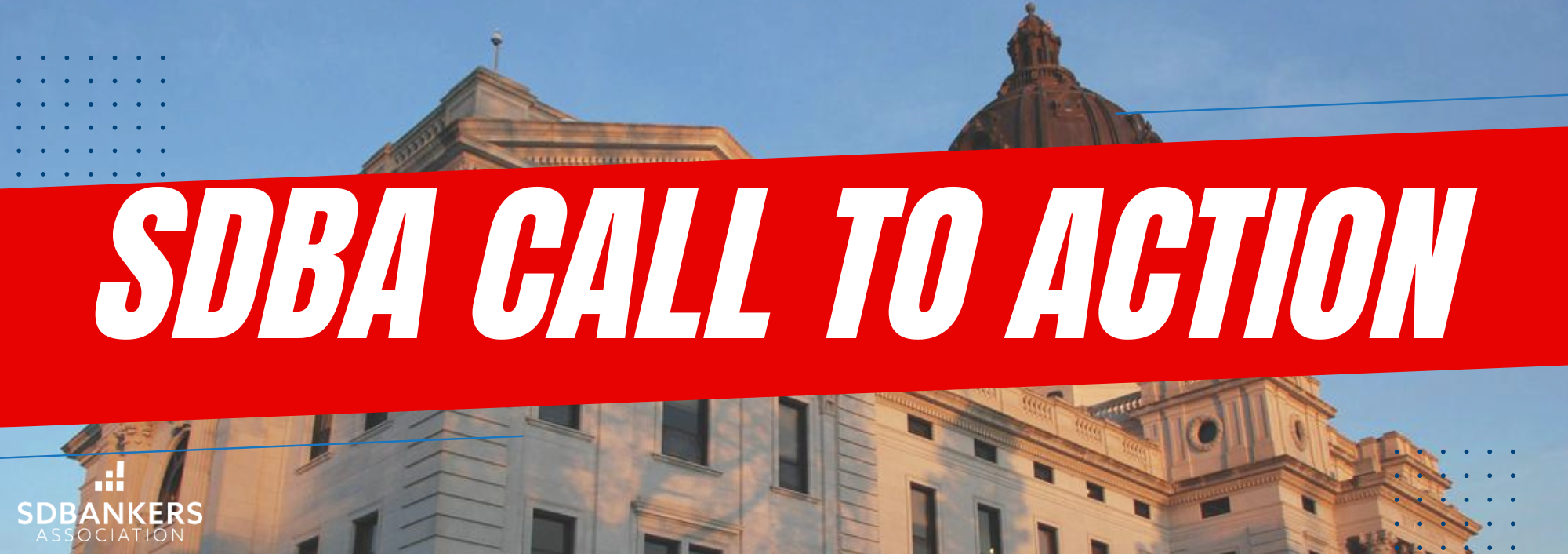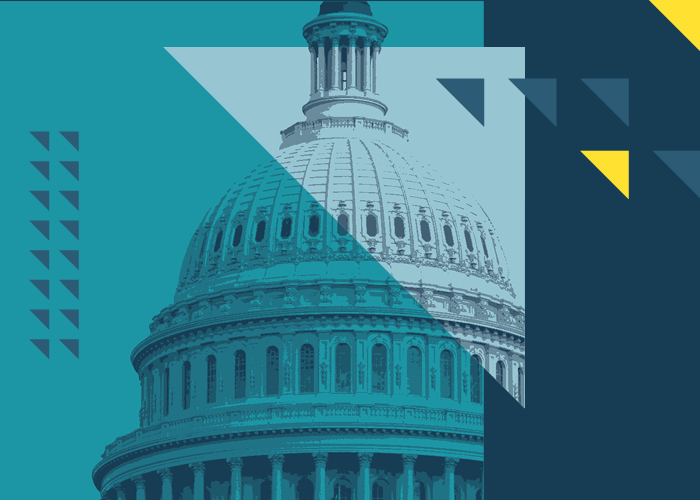|

News
SDBA Updates
SDBA Events
Online Education
Compliance Alliance
FINAL CALL TO ACTION: HB 1224
Hearing scheduled for 10am on Friday, February 20, 2026
 HB 1224 will be heard this Friday at 10:00 a.m. CST in House Commerce & Energy. This is our last opportunity to ensure committee members hear directly from the bankers who serve their communities every day. HB 1224 will be heard this Friday at 10:00 a.m. CST in House Commerce & Energy. This is our last opportunity to ensure committee members hear directly from the bankers who serve their communities every day.
Your outreach has already made a difference. Participation has been strong, and legislators are paying attention. Now we need one more push.
Please take a few minutes TODAY to email or call all 13 members of the House Commerce & Energy Committee and respectfully urge a NO vote on HB 1224.
CALL TO ACTION: HB 1248
 HB 1248: An Act to amend provisions of the Uniform Commercial Code HB 1248: An Act to amend provisions of the Uniform Commercial Code
Our message remains the same as in Sessions past: Current South Dakota law already provides that securities held through a broker or intermediary are the property of the investor — not the intermediary — and are not subject to claims of the intermediary’s creditors. This is expressly stated in Article 8 of the UCC.
The UCC is deliberately uniform across all states. Deviating from that framework—absent a demonstrated problem—creates uncertainty for lenders and investors alike.
South Dakota should not become an outlier in national commercial law to address a theoretical concern that has not materialized.
Please take a few minutes TODAY to contact all 13 members of the House Judiciary to oppose HB 1224.
White House: CFPB has cost consumers billions of dollars
ABA Banking Journal: Bankers share stablecoins’ opportunities, risks for community banks

SDSU Extension Farm Real Estate Market Survey
 You are invited to participate in the 2026 SDSU Extension Farm Real Estate Market Survey, which examines South Dakota agricultural land markets. If you agree to participate, you will be asked to complete an online survey that includes questions about land values, cash rental rates, and current market conditions. The survey should take approximately 5–10 minutes to complete. You may skip any question or stop participating at any time. You are invited to participate in the 2026 SDSU Extension Farm Real Estate Market Survey, which examines South Dakota agricultural land markets. If you agree to participate, you will be asked to complete an online survey that includes questions about land values, cash rental rates, and current market conditions. The survey should take approximately 5–10 minutes to complete. You may skip any question or stop participating at any time.
Your participation is voluntary. There are no penalties or consequences if you choose not to participate, and there are no foreseeable risks associated with participation. The information collected will provide valuable insights for landowners, farmers, and other agricultural industry participants.
Your responses will be kept confidential. Results will be analyzed and reported only in aggregate form and shared through SDSU Extension publications and the SDSU Extension website. If you have questions about the study, please contact Hoanh Le at [email protected]. If you have any questions concerning your rights as a research subject, you may contact SDSU’s Research Integrity and Compliance Officer at 605-688-5642 or [email protected].
Deadline: March 10, 2026
Begin Survey
GSBC+Invest Community Bank Performance Institute
May 4-7, 2026 | University of Colorado Boulder
The Community Bank Performance Institute is a four-day program designed to enhance community banks’ financial performance. The curriculum focuses on asset-liability management strategies, investments, liquidity management and scenario planning and analysis, all taught by experienced industry professionals and faculty.
Registration Information
GSB Human Resource Management School
April 20-24, 2026 | Madison, WI
Connect HR strategy to talent management, legal compliance, and profitability, translating strategy into bottom-line performance. Designed for: HR professionals, CEOs, and senior managers.
Learn more

2026 Dakota School of Lending Principles
April 7-10, 2026 | Pierre
 The Dakota School of Lending Principles, hosted by the South Dakota Bankers Association and co-sponsored by the North Dakota Bankers Association on April 7-10, 2026, in Pierre, S.D., is a learning event with one foot grounded in the classroom and one foot in the bank. This school allows students to learn the theory and process of basic lending and then put this knowledge to work in actual nuts and bolts sessions. The Dakota School of Lending Principles, hosted by the South Dakota Bankers Association and co-sponsored by the North Dakota Bankers Association on April 7-10, 2026, in Pierre, S.D., is a learning event with one foot grounded in the classroom and one foot in the bank. This school allows students to learn the theory and process of basic lending and then put this knowledge to work in actual nuts and bolts sessions.
The school provides basic instruction appropriate for loan officer trainees, loan support personnel and personal bankers. To ensure exposure to bank structure and terminology, it is recommended that applicants have a minimum of six months lending experience or one year of loan department experience. Applicants not meeting the suggested prerequisites will be contacted to discuss admission qualifications.
Loan Modules
In the four modules on loan types, learn the lending process by studying elements applicable to each loan type: terminology, the application process, interviewing, investigation, credit analysis, loan structure, decision communication and selling. Case studies and exercises provide hands-on learning experience.
Details & Registration
2026 ABA Washington Summit
March 9-11, 2026 | Marriott Marquis | Washington D.C.
 Join the biggest annual gathering of bank leaders in Washington to push for a bank policy framework that lets your bank stay focused on serving your customers, clients and communities. Hear directly from key players in the 119th Congress and the new administration on what the future holds for banks of all sizes. Join the biggest annual gathering of bank leaders in Washington to push for a bank policy framework that lets your bank stay focused on serving your customers, clients and communities. Hear directly from key players in the 119th Congress and the new administration on what the future holds for banks of all sizes.
The SDBA is currently planning to attend the Summit and would like to invite you and your staff to participate as well. Registration is free and you can learn more and sign up here. Join us as we hear from top-notch speakers, connect with our congressional delegations' offices and dine with our friends at the NDBA. You won’t want to miss this opportunity to engage on multiple levels.
If you or one of your staff would like to attend, the SDBA will provide a $500 stipend (1 per member bank) to help defray the costs of any banker attending from a member bank not currently represented on the SDBA Board. There will also be an Emerging Leaders’ Forum and a Women’s Leadership Forum held in conjunction with the Summit.
2026 SDBA New Accounts Seminar
April 21, 2026 | Sioux Falls
Managing risk is the #1 priority for all financial institutions, starting at the new account desk. If a criminal cannot open a bank account, they cannot negotiate a stolen check, embezzle from their employer, or steal from your organization and community. Well-trained new account personnel and universal bankers who recognize and stop attempted fraudulent activity are the first lines of defense in protecting a financial institution from fraudsters. Unfortunately, new account personnel are often trained "on the job," which results in an environment of potential vulnerability and unnecessary losses.
Trust and business accounts continue to grow in popularity and complexity - LLCs owned by Revocable Trusts and businesses owned by other businesses… the need for ongoing compliance training is paramount to maintain diligence and update processes and procedures.
This full-day program is one of the country's most comprehensive seminars on opening deposit accounts. The session answers many of the complicated questions customers and employees ask. The 200+ page detailed manual, included in the registration and customized to your state law, has become an invaluable resource for banks across the state. These workshops are highly interactive. Come prepared to get your questions answered!
Details & Registration
2026 FDIC Directors College
May 28, 2026 | Sioux Falls
The FDIC, in partnership with the South Dakota Bankers Association, will hold the 2026 Bank Directors' College on Thursday, May 28th, at the Ramkota Hotel in Sioux Falls, SD. This one-day educational seminar was designed with outside directors in mind, but the presentations will include up-to-date information on various emerging issues relevant to all bank directors. The presentations will be delivered by a group of experienced FDIC speakers and subject matter experts. Please consider this unique opportunity to interact with your bank's regulators and enhance your board's experience and knowledge.
Breakouts
- Accounting
- Capital Markets
- Consumer Protection
- Cybersecurity/IT
- Insider Abuse and Fraud Prevention
- Third-Party Relationships
Details & Registration
2026 National Ag School for Beginning Ag Bankers
June 22-25, 2026 | Spearfish
 Ready to take your agricultural lending skills to the next level? Join us June 22-25, 2026, on the scenic campus of Black Hills State University in Spearfish, SD for an immersive, hands-on school designed specifically for beginning ag bankers. Sponsored by the South Dakota Bankers Association, this intensive program covers all aspects of ag lending—including credit analysis, scoring and risk rating, managing problem loans, and collaborative case studies. Ready to take your agricultural lending skills to the next level? Join us June 22-25, 2026, on the scenic campus of Black Hills State University in Spearfish, SD for an immersive, hands-on school designed specifically for beginning ag bankers. Sponsored by the South Dakota Bankers Association, this intensive program covers all aspects of ag lending—including credit analysis, scoring and risk rating, managing problem loans, and collaborative case studies.
CURRICULUM HIGHLIGHTS
The National School for Beginning Ag Bankers is designed to give you the knowledge and confidence to make smarter, stronger lending decisions. Perfect for ag bankers with zero to three years of experience, this program blends expert instruction with practical, hands-on learning.
WHAT YOU'LL LEARN
- The current ag economy and industry trends
- Balance sheet and working capital analysis
- Earnings and cash flow analysis
- Futures, options, and risk management strategies
- Loan servicing and management assessment
- Customer profiling and relationship-building techniques
With 25+ hours of interactive instruction, you’ll tackle real-world challenges through case studies and problem-solving exercises. A dynamic bank simulation lets you see firsthand how your lending decisions impact the entire bank operation—across all departments.
Details & Registration
Online Education

Participating in learning opportunities outside the bank can be challenging. Take advantage of the SDBA's extensive selection of webinars and on-demand training to enhance your banking expertise directly from your computer.
GSB Online Seminars
OnCourse Learning
SBS Institute
ABA Training
Question of the Week
Q: Does our Trust & Wealth Management Department have to file CTRs?
A: No matter how your bank’s Trust & Wealth Management Department is structured, it’s probably already filing something. But, depending on how it’s structured, the specific reporting obligations may differ. In most cases, the trust operation either already is (or soon will be) subject to FinCEN reporting requirements.
The starting point is 31 CFR §§ 1010.310 through 1010.314, which impose reporting requirements for transactions in currency on “financial institutions.”
As the regulation states:
"§ 1010.310 Reports of transactions in currency.
Sections 1010.310 through 1010.314 set forth the rules for the reporting by financial institutions of transactions in currency. Unless otherwise indicated, the transactions in currency reporting requirements in §§ 1010.310 through 1010.314 apply to all financial institutions. Each financial institution should refer to subpart C of its chapter X part for any additional transactions in currency reporting requirements." 31 CFR 1010.310”
And:
"(t) Financial institution. Each agent, agency, branch, or office within the United States of any person doing business, whether or not on a regular basis or as an organized business concern, in one or more of the capacities listed below:
"(t) Financial institution. Each agent, agency, branch, or office within the United States of any person doing business, whether or not on a regular basis or as an organized business concern, in one or more of the capacities listed below:
(1) A bank (except bank credit card systems);
(2) A broker or dealer in securities;
(3) A money services business as defined in paragraph (ff) of this section;
(4) A telegraph company; [...]
[...] (7) A person subject to supervision by any state or Federal bank supervisory authority;
(8) A futures commission merchant;
(9) An introducing broker in commodities; or
(10) A mutual fund." 31 CFR 1010.100(t)
If the trust department is simply an actual “department” of the national bank (operating under the same charter) then the analysis is relatively straightforward. A national bank is a “financial institution” under § 1010.100(t), and therefore the currency transaction reporting requirements in §§ 1010.310 through 1010.314 already apply – meaning an actual "bank department” where trust activity is conducted through the national bank itself would be subject to these obligations.
If, however, the trust function operates through a separately chartered trust company or wealth management affiliate (even if wholly owned by the bank) that entity must independently meet the definition of “financial institution” under § 1010.100(t) for the CTR rules to apply. Depending on its charter and supervisory status, a separately chartered entity may or may not fall within that definition.
With that said, that brings us to an important final rule – FinCEN’s “Financial Crimes Enforcement Network: Anti-Money Laundering/Countering the Financing of Terrorism Program and Suspicious Activity
Report Filing Requirements for Registered Investment Advisers and Exempt Reporting Advisers.” (Notably, the rule’s title – as descriptive as it is – somewhat buries the lede in terms of scope.)
This rule (which has recently had its effective date extended from January 1, 2026 to January 1, 2028) would expand the definition of "financial institution" under 31 CFR 1010.100(t) – and therefore the related filing obligations of 31 CFR §§ 1010.310 through 1010.314 (and all other applicable requirements such as AML program, SARs, etc.) – to include Registered Investment Advisers (RIAs) and Exempt Reporting Advisers (ERAs).
Accordingly, if a trust or wealth management affiliate is registered as an RIA or operates as an ERA, it would fall within the scope of these requirements as of that date.
As alluded to in our opening line (and as the final rules points out) it is additionally worth noting that RIAs are already required to report the receipt of more than $10,000 in currency and certain negotiable instruments using joint FinCEN / Internal Revenue Service Form 8300 (effectively, the current IA equivalent of a CTR), pursuant to 31 CFR 1010.330.
At a high level, depending on the actual nature of this "trust department," they either already are subject to 31 CFR 1010.310, or eventually will be.
As always, the institution should review its organizational structure, supervisory status, and internal policies to ensure alignment with current and forthcoming FinCEN requirements.
Learn how to put compliance management solutions from Compliance Alliance to work for your bank, by contacting (888) 353-3933 or [email protected] and ask for our Membership Team. For timely compliance updates, subscribe to Bankers Alliance’s email newsletters.
SDBA eNews Archive
Advertising OpportunityLearn more about sponsoring the SDBA eNews
Questions/Comments
Contact the SDBA at 605.224.1653 or via email
|


 HB 1224 will be heard this Friday at 10:00 a.m. CST in House Commerce & Energy. This is our last opportunity to ensure committee members hear directly from the bankers who serve their communities every day.
HB 1224 will be heard this Friday at 10:00 a.m. CST in House Commerce & Energy. This is our last opportunity to ensure committee members hear directly from the bankers who serve their communities every day.

 Security researchers have discovered more than 300 Chrome extensions that leak browser data, spy on their users, or outright steal users’ data.
Security researchers have discovered more than 300 Chrome extensions that leak browser data, spy on their users, or outright steal users’ data.


 The Dakota School of Lending Principles, hosted by the South Dakota Bankers Association and co-sponsored by the North Dakota Bankers Association on April 7-10, 2026, in Pierre, S.D., is a learning event with one foot grounded in the classroom and one foot in the bank. This school allows students to learn the theory and process of basic lending and then put this knowledge to work in actual nuts and bolts sessions.
The Dakota School of Lending Principles, hosted by the South Dakota Bankers Association and co-sponsored by the North Dakota Bankers Association on April 7-10, 2026, in Pierre, S.D., is a learning event with one foot grounded in the classroom and one foot in the bank. This school allows students to learn the theory and process of basic lending and then put this knowledge to work in actual nuts and bolts sessions. Join the biggest annual gathering of bank leaders in Washington to push for a bank policy framework that lets your bank stay focused on serving your customers, clients and communities. Hear directly from key players in the 119th Congress and the new administration on what the future holds for banks of all sizes.
Join the biggest annual gathering of bank leaders in Washington to push for a bank policy framework that lets your bank stay focused on serving your customers, clients and communities. Hear directly from key players in the 119th Congress and the new administration on what the future holds for banks of all sizes.